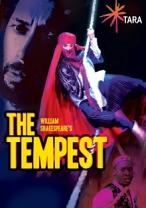The Tempest Review Tara Arts 2008
Shakespeare's last, and arguably his most important play is reworked here by Asian arts group Tara who've now been presenting plays for more than 30 years.
In the hands of director Jatinda Verma and designer Claudia Mayer, 'The Tempest' takes on an Islamic dimension in terms of costume, sound effects and many of the actors' mannerisms and movement. Though there were times when this didn't seem at odds with Shakespeare's magical plot and language, there were several points where it grated. For example, when Ferdinand meets Miranda, she's dressed in a sort of burka which covers almost her entire body including her face. So how come Ferdinand suddenly has the hots for her? For all he knows, she could be a he, or perhaps a demon in drag! Of course, Prospero is controlling events, but we can't really believe Ferdinand considers Miranda a 'wonder' when he's only seen her feet.
Small companies have a tough time and usually exist on meagre budgets. This imposes restrictions on the creative team, limiting their freedom and room for manoeuvre in terms of set design and the size of the cast. All the actors here, except Caroline Kilpatrick who plays Ariel, double-up in different roles. Though this is expected and understood, the economies here have gone rather too far. The decision to have Robert Mountford play Prospero and Trinculo, and to have Jessica Manley play Miranda as well as King Alonzo, left them with a lot of fancy footwork to do, as well as leaving the audience more than a little bewildered. Manley struggled in vain to convince us she was King of Naples.
The set design also contributed to the lack of clarity. Several large ropes hang from centre stage for the entire duration of the play. They work fairly well in the shipwreck scene, but later they become Propspero's mantle, swords and all other manner of things. Now I'm all for economy, but would it really have cost that much to borrow a suitable coat, or even a stick and a couple of swords? And the back projections which could have been both humorous and descriptive, seemed vague and often puzzling.
One of the central questions which any production of this play has to deal with is what is the nature of Prospero's character? I don't think Tara have come up with a convincing explanation. Surely, a Duke who buries his head in books about magic leaving others to rule his affairs must be something of an oddball, or at least eccentric to some degree. Robert Mountford's Prospero is part bank manager, part solicitor, the kind of reasonable person you might expect to bump into at your local conservative club (or, maybe not!). It's true that he loses his rag and grabs hold of Ariel's hair at one point (unnecessarily in my view), but for the rest of the play he is calm, controlled and pretty 'normal'. I found this hard to swallow even though Mountford gained in confidence as the evening wore on, and produced a sensitive epilogue.
Another issue which has to be resolved with The Tempest is the matter of whether Prospero is out for vengeance. Jatinder Verma states her vision quite firmly in her programme notes: "Prospero is a person who turns his knowledge to darker ends because he is obsessed with vengeance", she says. Now it might be that, when Prospero was first turfed out of his Dukedom, he sought vengeance, but by the time he's ready to whip up the storm, he's gone beyond vengeance and is already focused on reconciliation. This is plain because he separates the nobles in order to bring Miranda and Ferdinand together. What prospero is really seeking is a place back in society for his daughter as well as himself. With overwhelmingly formidable power - he can control gods, according to Caliban - Prospero could wreak havoc on all and sundry, but what he actually does is pretty tame apart from the storm, during which not a hair on anyone's head is actually hurt.
Shakespeare's work is much funnier than the majority of productions give the writer credit for. I don't think the direction here helped to exploit the humour, even though there are some very funny lines. It's true that the audience seemed a little on the humorless side, but the director needed to signpost more clearly that the audience was permitted to laugh.
The Tempest has to be one of my favourite plays, but I'm afraid that Tara's version simply left me confused, dissatisfied and rather disappointed.
Originally published on
